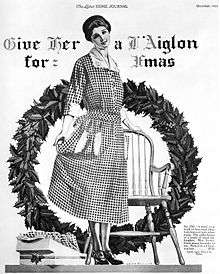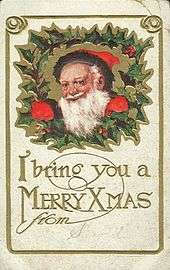Xmas
Xmas (also X-mas) is a common abbreviation of the word Christmas. It is sometimes pronounced /ˈɛksməs/, but Xmas, and variants such as Xtemass, originated as handwriting abbreviations for the typical pronunciation /ˈkrɪsməs/. The "X" comes from the Greek letter Chi, which is the first letter of the Greek word Christós (Greek: Χριστός), which became Christ in English.[1] The suffix -mas is from the Latin-derived Old English word for Mass.[2]

There is a common misconception that the word Xmas stems from a secular attempt to remove the religious tradition from Christmas[3] by taking the "Christ" out of "Christmas", but its use dates back to the 16th century.
Style guides and etiquette
"Xmas" is deprecated by some modern style guides, including those at the New York Times,[4] The Times, The Guardian, and the BBC.[5] Millicent Fenwick, in the 1948 Vogue's Book of Etiquette, states that "'Xmas' should never be used" in greeting cards.[6] The Cambridge Guide to Australian English Usage states that the spelling should be considered informal and restricted to contexts where concision is valued, such as headlines and greeting cards.[7] The Christian Writer's Manual of Style, while acknowledging the ancient and respectful use of "Xmas" in the past, states that the spelling should never be used in formal writing.[8]
History
Use in English

Early use of "Xmas" includes Bernard Ward's History of St. Edmund's college, Old Hall (originally published circa 1755).[9] An earlier version, "X'temmas", dates to 1551.[9] Around 1100 the term was written as "Xp̄es mæsse" in the Anglo-Saxon Chronicle.[1] "Xmas" is found in a letter from George Woodward in 1753.[10] Lord Byron used the term in 1811,[11] as did Samuel Coleridge (1801)[5] and Lewis Carroll (1864).[11] In the United States, the fifth American edition of William Perry's Royal Standard English Dictionary, published in Boston in 1800, included in its list of "Explanations of Common Abbreviations, or Contraction of Words" the entry: "Xmas. Christmas."[12] Oliver Wendell Holmes, Jr. used the term in a letter dated 1923.[11] Since at least the late 19th century, "Xmas" has been in use in various other English-language nations. Quotations with the word can be found in texts first written in Canada,[13] and the word has been used in Australia,[7] and in the Caribbean.[14] Merriam-Webster's Dictionary of English Usage stated that modern use of the term is largely limited to advertisements, headlines and banners, where its conciseness is valued. The association with commerce "has done nothing for its reputation", according to the dictionary.[11]
In the United Kingdom, the former Church of England Bishop of Blackburn, Alan Chesters, recommended to his clergy that they avoid the spelling.[5] In the United States, in 1977 New Hampshire Governor Meldrim Thomson sent out a press release saying that he wanted journalists to keep the "Christ" in Christmas, and not call it Xmas—which he called a "pagan" spelling of Christmas.[15]
Use of "X" for "Christ"
The abbreviation of Christmas as "Xmas" is a source of disagreement among Christians who observe the holiday.
The December 1957 News and Views published by the Church League of America, a conservative organization co-founded in 1937 by George Washington Robnett,[16] attacked the use of Xmas in an article titled "X=The Unknown Quantity". The claims were picked up later by Gerald L. K. Smith, who in December 1966 claimed that Xmas was a "blasphemous omission of the name of Christ" and that "'X' is referred to as being symbolical of the unknown quantity." Smith further argued that Jews introduced Santa Claus to suppress the New Testament accounts of Jesus, and that the United Nations, at the behest of "world Jewry", had "outlawed the name of Christ".[17] There is, however, a well documented history of use of Χ (actually a chi) as an abbreviation for "Christ" (Χριστός) and possibly also a symbol of the cross.[18][19] The abbreviation appears on many Orthodox Christian religious icons.
Dennis Bratcher, writing for a website for Christians, states "there are always those who loudly decry the use of the abbreviation 'Xmas' as some kind of blasphemy against Christ and Christianity".[20] Among them are evangelist Franklin Graham and former CNN contributor Roland S. Martin. Graham stated in an interview:
"for us as Christians, this is one of the most holy of the holidays, the birth of our savior Jesus Christ. And for people to take Christ out of Christmas. They're happy to say merry Xmas.[21] Let's just take Jesus out. And really, I think, a war against the name of Jesus Christ."[22]
Roland Martin likewise relates the use of "Xmas" to his growing concerns of increasing commercialization and secularization of one of Christianity's highest holy days.[23] Bratcher posits that those who dislike abbreviating the word are unfamiliar with a long history of Christians using X in place of "Christ" for various purposes.
The word "Christ" and its compounds, including "Christmas", have been abbreviated in English for at least the past 1,000 years, long before the modern "Xmas" was commonly used. "Christ" was often written as "Xρ" or "Xt"; there are references in the Anglo-Saxon Chronicle as far back as 1021. This X and P arose as the uppercase forms of the Greek letters χ (Ch) and ρ (R) used in ancient abbreviations for Χριστος (Greek for "Christ").[1] The Chi-Rho, an amalgamation of the two Greek letters rendered as ☧ (Unicode character U+2627 ☧ CHI RHO) is a symbol often used to represent Christ in Catholic, Protestant, and Orthodox Christian Churches.[24]
The Oxford English Dictionary (OED) and the OED Supplement have cited usages of "X-" or "Xp-" for "Christ-" as early as 1485. The terms "Xtian" and less commonly "Xpian" have also been used for "Christian". The OED further cites usage of "Xtianity" for "Christianity" from 1634.[1] According to Merriam-Webster's Dictionary of English Usage, most of the evidence for these words comes from "educated Englishmen who knew their Greek".[11]
In ancient Christian art, χ and χρ are abbreviations for Christ's name.[25] In many manuscripts of the New Testament and icons, Χ is an abbreviation for Χριστος,[26] as is XC (the first and last letters in Greek, using the lunate sigma);[27] compare IC for Jesus in Greek.
Other uses of "X(t)" for "Chris(t)-"
Other proper names containing the name "Christ" besides those mentioned above are sometimes abbreviated similarly, either as "X" or "Xt", both of which have been used historically,[28] e.g., "Xtopher" or "Xopher" for "Christopher", or "Xtina" or "Xina" for the name "Christina".
In the 17th and 18th centuries, "Xene" and "Exene" were common spellings for the given name Christine. The American singer Christina Aguilera has sometimes gone by the name "Xtina". Similarly, Exene Cervenka has been a noted American singer-songwriter since 1977.
This usage of "X" to spell the syllable "kris" (rather than the sounds "ks") has extended to "xtal" for "crystal", and on florists' signs to "xant" for "chrysanthemum",[29] even though these words are not etymologically related to "Christ": "crystal" comes from a Greek word meaning "ice" (and not even using the letter χ), and "chrysanthemum" comes from Greek words meaning "golden flower", while "Christ" comes from a Greek word meaning "anointed".
See also
- Christogram
- Christmas controversies
- Labarum
- Names and titles of Jesus
References
- "X n. 10.". Oxford English Dictionary. Oxford University Press. 2011. Retrieved 17 June 2011.
- Catholic Encyclopedia: Liturgy of the Mass. Retrieved 20 December 2007.
- O'Conner, Patricia T.; Kellerman, Stewart (2009). Origins of the Specious: Myths and Misconceptions of the English Language. New York: Random House. p. 77. ISBN 978-1-4000-6660-5.
- Siegel, Allan M. and William G. Connolly, The New York Times Manual of Style and Usage, Three Rivers Press, 1999, ISBN 978-0-8129-6389-2, pp 66, 365, retrieved via Google Books, December 27, 2008
- Griffiths, Emma, "Why get cross about Xmas?", BBC website, December 22, 2004. Retrieved December 28, 2008.
- Fenwick, Millicent, Vogue's Book of Etiquette: A Complete Guide to Traditional Forms and Modern Usage, Simon and Schuster, 1948, p 611, retrieved via Google Books, December 27, 2008; full quote seen on Google Books search page
- Peters, Pam, "Xmas" article, The Cambridge Guide to Australian English Usage, Cambridge University Press, 2007, ISBN 978-0-521-87821-0, p 872, retrieved via Google Books, December 27, 2008
- Hudson, Robert, "Xmas" article, The Christian Writer's Manual of Style: Updated and Expanded Edition, Zondervan, 2004, ISBN 978-0-310-48771-5 p 412, retrieved via Google Books, December 27, 2008
- "Xmas, n.". Oxford English Dictionary. Oxford University Press. 2011. Retrieved 17 June 2011.
- Mullan, John and Christopher Reid, Eighteenth-century Popular Culture: A Selection, Oxford University Press, 2000, ISBN 978-0-19-871134-6, p 216, retrieved via Google Books, December 27, 2008
- "Xmas" article, Merriam-Webster's Dictionary of English Usage, Merriam-Webster, 1994, p 968, ISBN 978-0-87779-132-4, retrieved via Google Books, December 27, 2008
- Perry, William (1800). The Royal Standard English Dictionary. Boston: Isaiah Thomas & Ebenezer T. Andrews. p. 56.
- Kelcey, Barbara Eileen, Alone in Silence: European Women in the Canadian North Before 1940, McGill-Queen's Press, 2001, ISBN 978-0-7735-2292-3 ("We had singing practice with the white men for the Xmas carols", written by Sadie Stringer in Peel River, Northwest Territories, Canada), p 50, retrieved via Google Books, December 27, 2008
- Alssopp, Richard, "most1" articleDictionary of Caribbean English Usage, University of the West Indies Press, 2003, ISBN 978-976-640-145-0 ("The most day I enjoy was Xmas day" — Bdos, 1985), p 388, retrieved via Google Books, December 27, 2008
- "X-mas is 'X'ing out Christ'", The Montreal Gazette, December 8, 1977, accessed February 10, 2010
- "Subject Guide to Conservative and Libertarian Materials, in Manuscript Collections". University of Oregon.
- Kominsky, Morris (1970). "The Xmas Hoax". The Hoaxers: Plain Liars, Fancy Liars and Damned Liars. Boston: Branden Press. pp. 137–138. ISBN 0-8283-1288-5.
- "Christian Symbols and Their Descriptions". Ancient-symbols.com. Retrieved 8 December 2008.
- "Why Is There a Controversy Surrounding the Word 'Xmas'?". tlc.howstuffworks.com. 2007-11-21. Retrieved 25 December 2012.
- "The Origin of "Xmas"". CRI/Voice. 2007-12-03. Retrieved 2009-08-16.
- Amaefule, Chigozie (2019-12-16). "Merry Christmas Messages, SMS, Whatsapp & Facebook Status". Vereeke. Retrieved 2020-03-03.
- American Morning: A Conversation With Reverend Franklin Graham, CNN (December 16, 2005). Retrieved on December 29, 2009.
- Martin, Roland (December 20, 2007). Commentary: You can't take Christ out of Christmas, CNN. Retrieved on December 29, 2009.
- Christian Symbols: Chi-Rho Christian Symbols, Doug Gray, Retrieved 2009-12-07
- "Monogram of Christ". New Advent. 1911-10-01. Retrieved 2009-08-16.
- Rev. Steve Fritz (December 22, 2012). "The 'X' Factor". Lancaster Online. Retrieved December 25, 2012.
- Church Symbolism: An Explanation of the more Important Symbols of the Old and New Testament, the Primitive, the Mediaeval and the Modern Church by Frederick Roth Webber (2nd. edition, 1938). OCLC 236708
- http://www.all-acronyms.com/XT./Christ/1136835 "Abbreviation: Xt." Date retrieved: 19 Dec. 2010.
- "X". Everything 2. Retrieved 2009-08-16.
External links
| Wikimedia Commons has media related to Text:Xmas. |
| Look up Xmas in Wiktionary, the free dictionary. |
- An icon of Christ featuring the abbreviations IC and XC in the upper corners
- "Why get cross about Xmas?" (BBC, December 22, 2004)
